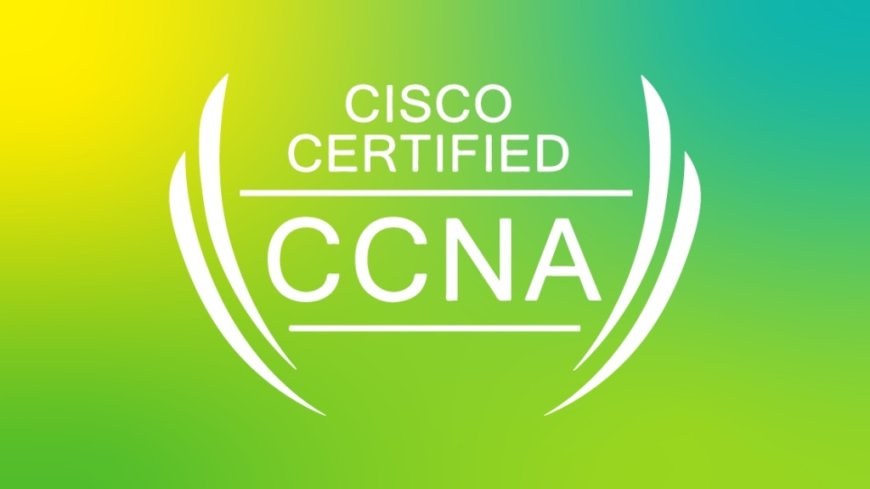Unlocking Career Success: Why CCNA Certifications Are Essential
In conclusion, CCNA certification serves as a cornerstone for building a successful career in networking. It not only validates your expertise but also opens doors to exciting job opportunities, higher earning potential, and continuous professional growth

In today's rapidly evolving digital landscape, where technology serves as the backbone of nearly every industry, the demand for skilled networking professionals has never been higher. As businesses strive to optimize their networks for efficiency, security, and scalability, the role of Cisco Certified Network Associate (CCNA) professionals has become indispensable. In this article, we'll delve into the significance of CCNA certifications and why they are crucial for both aspiring and seasoned networking professionals.
Understanding CCNA Certification
The CCNA certification, offered by Cisco Systems, is a globally recognized credential that validates an individual's expertise in networking fundamentals, IP connectivity, network access, IP services, security fundamentals, and automation and programmability. It serves as a benchmark for entry-level networking professionals, demonstrating their proficiency in designing, implementing, operating, and troubleshooting networks using Cisco technologies.
The Importance of CCNA Certification
-
Industry Recognition: CCNA certification is widely respected in the IT industry and is often a prerequisite for many networking roles. Employers recognize CCNA-certified professionals as competent and knowledgeable individuals capable of handling various networking challenges.
-
Career Advancement: Earning a CCNA certification can significantly enhance your career prospects. It opens doors to a wide range of job opportunities in networking, including network administrator, network engineer, systems administrator, and IT manager roles. With the increasing complexity of networks, employers place a premium on candidates with specialized skills and certifications like CCNA.
-
Skill Validation: Obtaining a CCNA certification validates your skills and knowledge in networking technologies, protocols, and best practices. It demonstrates your ability to configure and troubleshoot network devices, ensuring smooth and efficient network operations. This validation is particularly valuable for individuals looking to transition into networking roles or seeking validation of their existing skills.
-
Higher Earning Potential: CCNA-certified professionals typically command higher salaries compared to their non-certified counterparts. According to PayScale, the average salary for CCNA-certified professionals in the United States is significantly higher than that of non-certified networking professionals, highlighting the financial benefits of certification.
-
Global Opportunities: CCNA certification is recognized worldwide, providing opportunities for professionals to work in diverse geographical locations. Whether you're seeking employment in your local market or exploring international job opportunities, CCNA certification enhances your marketability and credibility as a networking professional.
-
Continuous Learning and Growth: The field of networking is constantly evolving, with new technologies, protocols, and security threats emerging regularly. Maintaining CCNA certification requires individuals to stay updated with the latest advancements in networking technology through continuing education and recertification exams. This commitment to lifelong learning ensures that CCNA-certified professionals remain at the forefront of industry trends and best practices.
How to Obtain CCNA Certification
Earning CCNA certification requires passing one or more exams administered by Cisco Systems. As of the latest version of the certification (as of the time of writing), candidates can choose from various CCNA tracks, including CCNA Routing and Switching, CCNA Security, CCNA Data Center, CCNA Collaboration, and CCNA Wireless, among others. Each track focuses on specific networking domains, allowing individuals to specialize in areas that align with their career goals and interests.
To prepare for the CCNA exam(s), candidates can enroll in Cisco-approved training courses, utilize study materials provided by Cisco, and practice using network simulation software to gain hands-on experience. Additionally, joining online forums and study groups can facilitate knowledge sharing and collaboration among aspiring CCNA-certified professionals.
Conclusion
In conclusion, CCNA certification serves as a cornerstone for building a successful career in networking. It not only validates your expertise but also opens doors to exciting job opportunities, higher earning potential, and continuous professional growth. Whether you're a recent graduate looking to enter the IT industry or an experienced professional seeking to advance your career, earning CCNA certification can be a transformative step toward achieving your career goals. Invest in your future today by pursuing CCNA certification and unlocking a world of possibilities in the dynamic field of networking.
For More Articles Click
What's Your Reaction?
 Like
0
Like
0
 Dislike
0
Dislike
0
 Love
0
Love
0
 Funny
0
Funny
0
 Angry
0
Angry
0
 Sad
0
Sad
0
 Wow
0
Wow
0























































